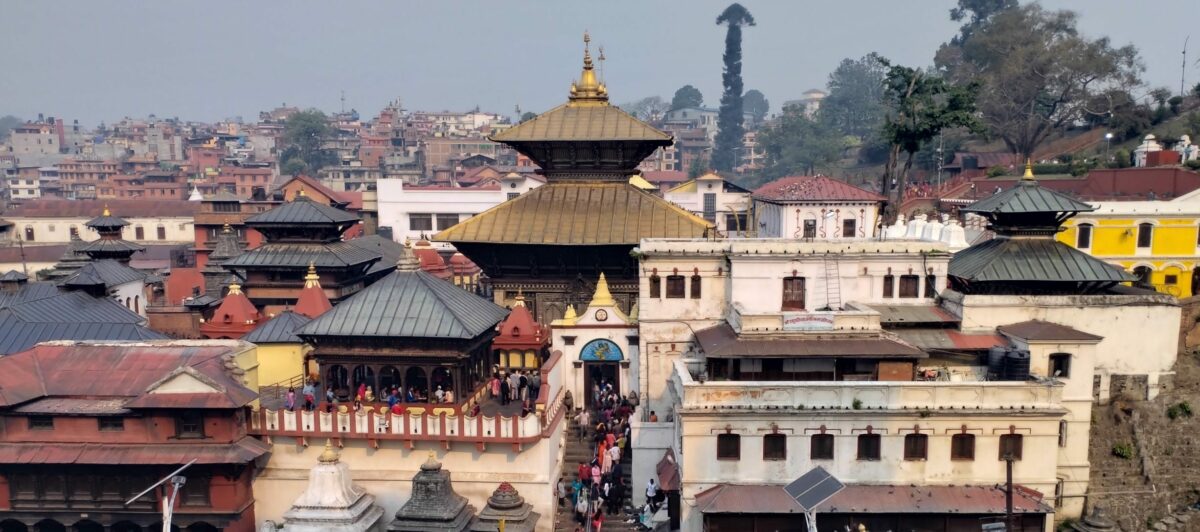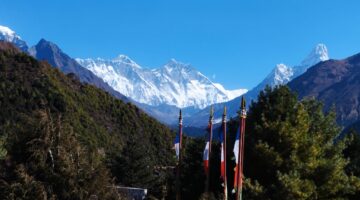Two beautiful Himalayan Kingdom countries with cultural diversity, amazing mountain views
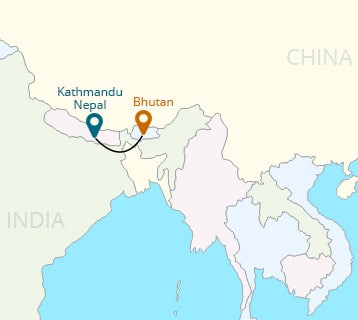
Nepal Bhutan Tours is a perfect blend of cultural richness, historical facts, spiritual calmness, natural splendor, and thrilling adventure activities. Nepal is a beautiful landlocked South Asian nation attracting numerous visitors for its cultural and natural beauty. The rich cultural heritages, ancient temples and stupas, ethnic diversities, culture and tradition, vibrant festivals, and UNESCO-listed World Heritage Sites all boast the cultural diversity in Nepal. Likewise, Nepal’s natural diversity is showcased through its lush green valleys, gorgeous landscapes, various flora and fauna, and snow-capped peaks including the world’s highest peak, Mount Everest. The sunrise views over the splendid mountain ranges or Jungle Safari or jungle walks in the lap of nature offer diversity to the visitors. Nepal is an ideal destination for visitors seeking cultural, historical, and natural diversity with the extra thrill of adventurous sports.
A small landlocked mountainous nation Bhutan is the only carbon-negative nation in the world. Bhutan’s 98.8% land is covered by mountains making it the most mountainous nation in the world. Naturally, Bhutan is rich with its rich primate life and the forest covering 71% of its land. Thus, Bhutan is globally recognized as a biodiversity hotspot. IUCN views Bhutan as a model for proactive conservation initiatives. The environmental sensitivity is highly reflected in its bans on plastic and animal killings. The rich culture and tradition of Bhutan harmoniously blend with its natural environments. Buddhism is deeply rooted in Bhutanese heritages which is why visitors can see abundant Dzongs, fortresses, and monasteries all over. Paro, Punakha, Thimphu, and Bumthang are major cities in Bhutan which is home to iconic landmarks. The pristine natural environment and rich cultural heritages with spirituality make Bhutan an ideal destination.
Nepal Bhutan Tours
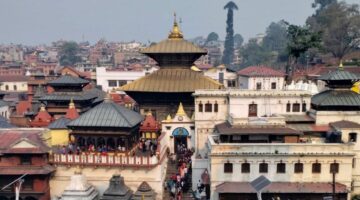
5 Reviews
Bhutan Nepal Luxury Trips
Bhutan: 4 Nights (Paro, Thimphu, Punakha)
Nepal: 6 Nights (Kathmandu Valley, Pokhara)
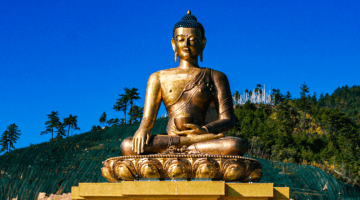
6 Reviews
Nepal Bhutan Luxury Tour
Nepal: 8 Nights (Kathmandu, Pokhara, Chitwan)
Bhutan: 3 Nights (Paro, Thimphu, Punakha)
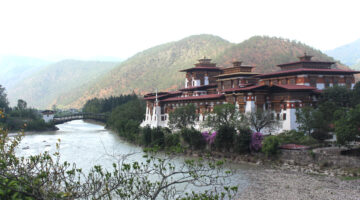
10 Reviews
Nepal Bhutan Private Tour 2026/2027
Nepal: 6 Nights (Kathmandu, Chitwan, Pokhara)
Bhutan: 6 Nights (Paro, Thimphu, Punakha)
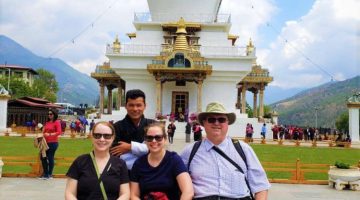
6 Reviews
Bhutan Nepal Short Tour
Nepal: 2 Nights (KTM, Bhaktapur, Lalitpur)
Bhutan: 2 Nights (Paro Valley, Thimphu)
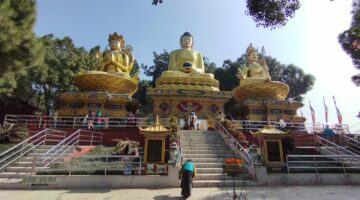
5 Reviews
Nepal Bhutan Cultural Tour
Nepal: 3 Nights (Kathmandu Valley, Nagarkot)
Bhutan: 3 Nights (Paro Valley, Thimphu)
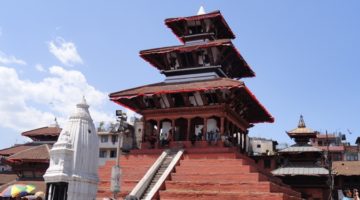
3 Reviews
Best of Bhutan Nepal Tour
Bhutan: 4 Nights (Paro, Thimphu, Punakha)
Nepal: 4 Nights in Kathmandu Valley, Pokhara)
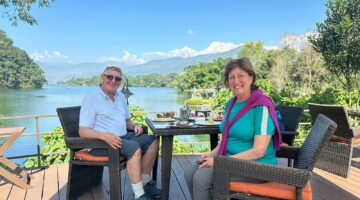
15 Reviews
Nepal Bhutan Popular Tour 2026/2027
Nepal: 6 Nights (Kathmandu Valley, Chitwan, Pokhara)
Bhutan: 4 Nights (Paro, Thimphu, Punakha)
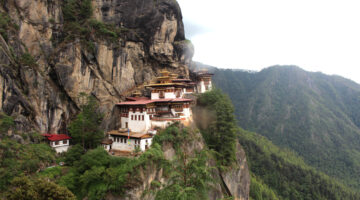
6 Reviews
Nepal Bhutan Tour with Trekking
Bhutan: 11 Nights (Paro, Thimphu, Punakha, Phobjikha, Trongsa, Bumthang, Gangtey)
Nepal: 12 Nights (Kathmandu Valley, Pokhara, Chitwan, Ghorepani)
Not satisfied with this itinerary?
Are you interested in planning a Custom Trip Customize Trip or Ask to Expert Ask to Expert
Essential Information
Essential Information of 'Bhutan'
Essential Documents
A valid passport, a Bhutanese visa, and additional documents (valid passport digital copies, recent digital photo prints) are required essential documents. We highly recommend getting travel insurance covering flight cancellations, high altitudes, loss/theft of goods, and medical and emergency evacuations.
Visa and Travel Permit
Obtain a Visa through the help of certified tour operators who handle the Visa process on your behalf. It is compulsory to book through tour operators for Bhutan tours. Submit your documents (valid passport digital copies, recent digital photo prints, arrival and departure dates, travel insurance, and payment details) for applying for online Visa approval. The visa costs USD 40 per person.
Sustainable Development Fee (SDF)
Travelers must pay a daily Sustainable Development Fee (SDF), which is an initiative of Bhutan to support its development. The details are as follows. Remember that all other travel expenses (accommodation, meals, guide tips, monument fees, etc.) are excluded.
New Revised SDF effective from September 1, 2023 until September 2027
Adults: USD 100 per person per night
Children (below 6): No SDF required
Children aged (6 to 11): 50% discount on SDF i.e. USD 50 per night
Children aged (12 and above): Full SDF rate applies i.e. USD 100 per person/ night
Food and Accommodation
Bhutan offers diverse food options for visitors including local Bhutanese cuisines to continental. Spicy chilies are the prime ingredients that add unique flavor to Bhutanese cuisine. There is a variety of accommodations in Bhutan from luxurious hotels to 4-star and 3-star hotels. Luxury hotels offer all premium facilities while the standard of 3-star and 4-star hotels in Bhutan might not match with those in Europe and America.
Health and Vaccinations
It is best if visitors are vaccinated for health safety. The recommended vaccines for travelers are typhoid, hepatitis A, polio, Japanese encephalitis, chikungunya, tickborne encephalitis, rabies, hepatitis B, influenza, COVID-19, pneumonia, meningitis, chickenpox, shingles, Tdap (tetanus, diphtheria, and pertussis) and measles, mumps, and rubella (MMR).
Cultural and environmental sensitivity
Bhutan is a sacred nation having high cultural and environmental sensitivity. So, respect the culture and environment. Wear suitable dress while visiting religious sites, and remove shoes and caps before entering the site. Also, try to keep the environment clean. Avoid using plastic bags, and tobacco use and smoking only in selected places.
Best Time to Visit
Spring (Mar-May) and Autumn (Sep-Nov) seasons are the best time to visit Bhutan. These seasons offer a stable climate with clear and beautiful views. Spring season is more beautiful with blooming flowers all over. Autumn season offers a variety with several festivals showcasing the rich Bhutanese culture and traditions.
Altitude Acclimatization
Traveling destinations are mostly below an altitude of 3,500 m but with changing altitude it can be challenging for some visitors. Thus, the itineraries are carefully planned keeping in mind the health concerns of the visitors.
Prime Attractions
Some prime attractions in Bhutan are Paro Taktsang (Tiger’s Nest Monastery), Buddha Dordenma Statue, Punakha Dzong, Dochu La Pass, Chhimi Lhakhang, etc.
Language
Dzongkha is Bhutan’s national language, however, English is widely spoken and understood throughout Bhutan.
Currency and Money
The Bhutanese national currency is Ngultrum. However, Indian currencies and US dollars are widely accepted as well. So, it is best to carry a mix of small denominations for ease because credit card machines and ATMs might not work sometimes.
Follow your guides
Licensed guides are compulsory while traveling to religious sites in Bhutan. We recommend strictly following the guide to avoid cultural and environmental misfortunes.
Responsible Tourism
Be a sensible visitor and respect the culture and environment. Seek permission before doing anything and wear appropriate clothes. Support local tourism to motivate them.
Essential Information of 'Nepal'
Essential Documents
A valid passport, a Nepalese visa, and additional documents (proof of onward travel or a hotel reservation) are essential documents required for Nepal travel. Travel Insurance covering high elevations, flight cancellations, loss/theft of goods, and medical and emergency evacuations are highly recommended.
Visa and Travel Permit
An online Visa is easily obtainable for visitors from most countries around the world. Moreover, visitors can also apply from the Nepalese consulate near their nation. Visa costs vary with Visa types such as tourist visas and multiple-entry visas.
Food and Accommodation
Nepal’s beauty is its cultural and ethnic diversity which offers a wide variety of dishes from diverse ethnic cuisines. There are also continental, Chinese, and Indian cuisine alternatives for international visitors for their preference. Accommodation in the cities ranges a wide variety from simple with basic facilities to luxury with premium amenities. Mountain trekking offers teahouse accommodations with basic meals and facilities.
Health and Vaccinations
We recommend visitors take vaccinations as precautions for health and safety purposes. The recommended vaccines for travelers are typhoid, hepatitis A, polio, Japanese encephalitis, chikungunya, tickborne encephalitis, rabies, hepatitis B, influenza, COVID-19, pneumonia, meningitis, chickenpox, shingles, Tdap (tetanus, diphtheria, and pertussis) and measles, mumps, and rubella (MMR).
Cultural Sensitivity
Cultural sensitivity in Nepal is highly considered so, we suggest being respectful to local cultures, traditions, and environment. Also, avoid passing sensitive comments, and wear suitable clothes while traveling to religious and cultural places.
Best Time to Visit
Spring (March-May) and Autumn (September-November) seasons are the best times to visit Nepal as it offers a favorable climate for sightseeing. It is also the ideal time to attend vibrant festivals, especially during the autumn season.
Altitude Acclimatization
Nepal is abundant with an altitude variety ranging from 58 m to 8848.86 m. However, the Kathmandu Valley’s average altitude is 1,500 meters and less than 1,000 meters in the Terai region. Thus, visitors needn’t get worried about altitude sickness while traveling to these destinations. Nonetheless, travelers planning to trek in the mountains above 2,500 m must take acclimatization rest to prevent altitude sickness.
Prime Attractions
Some of the prime attractions in Nepal are UNESCO World Heritage sites, ancient temples, and monasteries, Chitwan National Park, Pokhara, and Lumbini.
Language
There is a diversity of languages in Nepal where visitors can see several indigenous speaking their language. But, Nepali is a widely spoken language throughout the nation. However, in tourist places, Basic English is widely spoken and understood. It is also best to learn some basic Nepali phrases like ‘Namaste’ and ‘Dhanyabaad’ (Thank You) to connect with the locals.
Currency and Money
The official currency used in Nepal is the Nepalese rupee (NPR). For easy money transactions, we suggest carrying a small denomination of cash. There are credit card facilities but mostly in the cities. So, for anyone planning to trek in the mountains, it is best to carry cash as there are fewer ATMs available.
Follow your guides
Become a responsible visitor and strictly follow the laws regulations and guides. Especially while trekking, follow the guide’s guidelines to avoid any misadventures. Also, most trekking regions in Nepal require hiring a professional licensed guide.
Responsible Tourism
Be respectful of the local culture and environment, ask for permission before doing any activities, dress wisely, and support local tourism to motivate and promote them.
All rights reserved. Privacy Policy

"Payment accepted via SWIFT/TELEX transfer & major cards"
